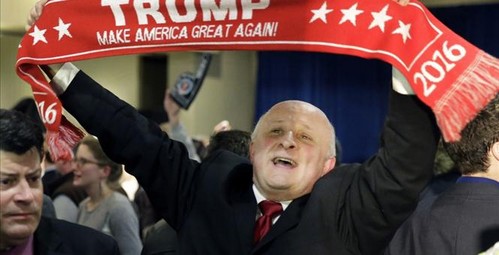President Wanted. Experienced Candidates Need Not Apply.
Leonid Bershidsky,
With the first two nominating contests out of the way, each party’s field remains split along ideological lines. But there also is a deep divide separating candidates who stress their governance experience and those who cast such a background as irrelevant or even a liability when it comes to fixing a “broken” or “rigged” system.
For Republicans, the New Hampshire primary campaign was, to a large extent, about this choice. After a weak showing in Iowa, the three Republican governors, Ohio’s John Kasich, Jeb Bush, formerly of Florida, and New Jersey’s Chris Christie, did their best to push their executive experience as the main selling point. Kasich campaigned on his success in balancing Ohio’s budget, Bush stressed his “steady hand” in Florida and Christie his success in cleaning up New Jersey after Hurricane Sandy. Perhaps the most memorable moment of the campaign in New Hampshire was Christie’s goading of Senator Marco Rubio during Saturday’s Republican debate: “You have not been involved in a consequential decision where you had to be held accountable. You just simply haven’t.”
All three did better in the Granite State than they did in Iowa. Now imagine if they were assembled into one synthetic “supercandidate”: He would get almost as many votes as Donald Trump. In Iowa, the merged governors didn’t break the 10 percent mark, losing to Ben Carson.

Christie reportedly is dropping out of the race, and Carly Fiorina has suspended her campaign. Kasich and Bush may hope that their governance professionalism will sell better as the marathon progresses. Kasich is building on his second-place finish Tuesday and deep-pocketed Bush wants to give the impression that he’s playing a patient long-term game.
On the Democratic side, Hillary Clinton, who also has campaigned on experience, should be chastened by her crushing loss to Senator Bernie Sanders in New Hampshire. I still haven’t met any takers for a straight bet against her winning the presidency, but, judging by the first two states’ results, there is a real possibility that the 2016 election could unfold like the one in 2008, rewarding charisma and ideology rather than experience. Barack Obama isn’t in this year’s race, of course, but there are several eloquent candidates on both sides who have plenty of populist appeal.
Here’s a little model of the voting split along the “experience vs. charisma/ideology” line in Iowa and New Hampshire. If you imagine the two states combined as a small country populated only with their most politically active voters, a wide gap emerges in favor of the charismatic leaders and ideologues:

As in 2008, U.S. voters appear to be more susceptible to passionate voices than to the notion of a “steady hand.” Mario Cuomo’s dictum about campaigning in poetry and governing in prose falls flat when faced with voters who don’t believe government works. Governance experience may actually be a disadvantage under these circumstances: Governors may tout their states’ achievements, but people don’t care about their specific successes because they believe that the whole system is flawed and that some kind of revolution — or at any rate sweeping change — is needed.
This is a bad year to be selling executive competence.
-
The assumption here is that people turning out to vote or caucus separately for the two parties would have voted the same in a general, mixed ballot. I think it’s reasonable, since in both Iowa and New Hampshire people can declare or change their affiliation on the day of the primary, so they don’t really face any constraints.







